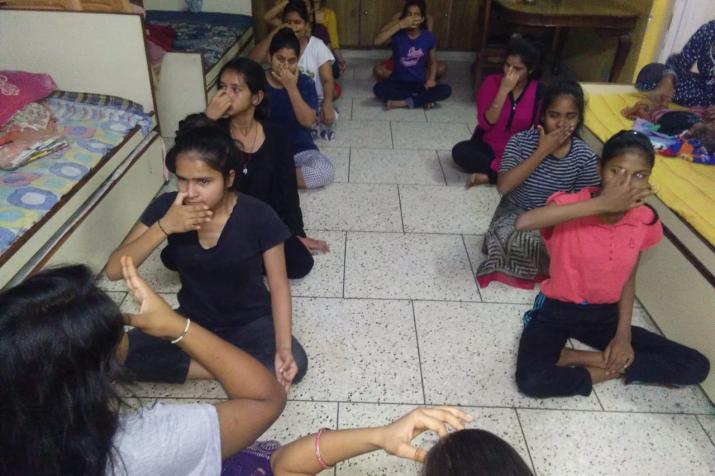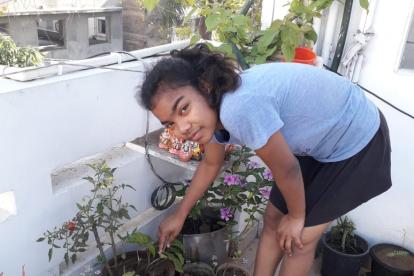
Udayan Care staff and children are adapting to new ways of life during the pandemic, and as a silver lining, experiencing even greater emotional bonding with each other.
Published April 17, 2020, last updated on July 27, 2020 under Voices of DGHI
Kiran Modi and Leena Prasad are with Udayan Care, which provides care and services for vulnerable youth in India. As long-time partners with DGHI faculty Sumi Ariely and her India SRT students on research and educational projects, Modi (who is founder and managing trustee of Udayan Care) and Prasad (assistant director of advocacy, research and training) share this perspective on how the pandemic is affecting Udayan Care and the children it serves.
The COVID-19 pandemic has affected adults of every nationality and class, showing us all how a public health emergency can bring life to a sudden halt. But for orphaned and separated children and youth, coming from significant traumatic backgrounds and already needing a great deal of support, these difficult times are creating unprecedented challenges, touching their lives more closely than they can express.
At Udayan Care, the pandemic caused us to immediately shift our priorities to protect the 200 children staying under our care. We provide residential care for children under the juvenile justice system in 17 small-group homes across four Indian states. When the pandemic hit, we carefully studied the advisories and guidelines issued by various agencies to ensure our homes were following the recommended precautions for childcare. We also compiled our own advisory, written specifically for the frontline workers so that they could understand instructions in their own language.

Children learn they can thrive even...
Our standard operating procedure reflects the unique and critical role that a children’s home can play in times of emergency. The aim is to ensure normalcy as much as possible, and the continued development and wellbeing of our children. One of the first steps we took across all our homes was to prevent entry of all outsiders, even those involved in day-to-day running of the homes. Mentors, counselors and volunteers all now work remotely, providing counseling and instruction over the phone. And it seems to be working!
We are receiving support from many sources and good Samaritans during the crisis. The dedication of our caregivers has been outstanding, as has the support from India’s child protection agencies. When residential caregivers were unable to take a child with a fever to a local hospital, for example, the district child protection officer arranged for a governmental hospital doctor to speak to the child over the phone to provide immediate medical advice.
Nurturing Children’s Creativity
The most heartening response has been from the children in our care, who are using their creative talents to express their feeling about the pandemic. Most are making drawings and illustrations about COVID-19, reflecting what they understand about the crisis and their hope of overcoming it. They have come up with coronavirus stories, poems, quizzes and even coronavirus theatre.
Our counselors and educators constantly engage with the children, keeping them occupied with educational materials and providing counseling as needed. The caregivers were informed to keep a special attention on those children already having mental health concerns to mitigate further risk from emotional distress. Some of the children are picking up misperceptions about the pandemic and precautions being taken from What’s App videos and other media, but our mentors, social workers and counselors are always in touch, hearing them patiently, offering ideas and allaying anxieties.
Managing this crisis has at times put our staff at wits’ end. It has been challenging to keep up with and respond to the many (and sometimes contradictory) advisories from different parts of government. Our team has its hands full training staff and children, managing the houses with reduced residential staff, troubleshooting online communications, monitoring food and supplies, and answering incessant phone calls. But our children and staff are adapting to new ways of life and as a silver lining, even showing greater emotional bonding with each other.
Outside Our Homes
We have of course been additionally concerned about the youth who have left our care and are living on their own. These teenagers in transition face difficult circumstances, exacerbated by this crisis. With offices and colleges closed, they are missing out on the little social support they had. Staying connected virtually has helped us keep these youth motivated, reducing their anxieties and feelings of isolation.
As one of these individuals reports, “Anxiety around COVID-19 is completely understandable, but the Zoom meetings (with support group members) made me feel I am not the only one experiencing this and that I have my friends around me. I now know that there are many things we can do together and be safe and engage even as we practice social distancing.”
Udayan Care also manages interventions with young girls from socioeconomically vulnerable families through the Udayan Shalini Fellowship. These girls have kept their heads high throughout the crisis. They have been encouraged to use their time to share “sunshine stories” on social media and in other ways. The team has sent regular communications encouraging girls to stay engaged and committed to making young lives shine in these troubled times. Udayan Care also has set up a relief fund to extend immediate support to families in this program who are the most affected by COVID-19.
The efforts, alertness and quick decisions by dedicated staff have helped them cope with the crisis and to mitigate the risk to young people who are already living in the toughest of circumstances. These times have reinforced our belief that working with children and youth can bring out the best in us all, and increases energy and positivity all around.
In the words of one of our children: “These are times when everyone is appearing troubled and we can do nothing to avoid them. But we should not be afraid of change and must adapt quickly to the new norms of life and deal with the situation positively, after which joyous times will come back.”
We believe there is light at the end of this tunnel, and working with children and youth in such times helps us discover our strengths as a family.


